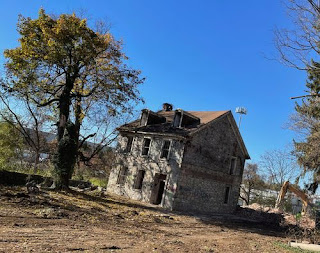PennLive
November 10, 2022
David H. Peiffer was astounded by what he discovered after he was asked to dig into the history of a dilapidated, centuries-old farmhouse visible from Route 581 near Camp Hill.
The house was built in the late 1700s by John Shopp Sr., who had connections to founders of the United Brethren Church. Beginning around 1800, it became a frequent “preaching place” for the church’s founding ministers.
Nearby residents gathered at the farmstead and it became known as the site of “mass conversions” where sizable groups, including some with “sordid hearts” and “loose tongues,” were overwhelmed by a life-changing faith, according to Peiffer’s research.
Ravaged by fires and other acts of vandalism, the limestone building, even with its 18-inch-thick walls, long ago passed the point of salvation.
Earlier this week, a demolition crew leveled the building.
“The property has been beyond redemption for so long,” said David Smith, the volunteer in charge of historic preservation for the Cumberland County Historical Society. Smith said he had obtained the owner’s permission to take a close look at the house last year.
Joe Sholly, a co-owner of BWB Inc., which handled the demolition, said: “It was unsalvageable. The floors were just gone. Just the amount of vandalism … I can’t even tell you how many fires were in this thing.”
Smith said the house was last occupied around the mid-1980s. He believes the presence of busy Route 581, located a few hundred feet away, made it unviable as a home.
Moreover, it’s located deep in an industrial park, with its five acres of once bucolic farmland surrounded by trucking companies, storage facilities, a steel company and a trash collection company.
John Shopp home
Photo shows the home as it looked around 1910. Photo credit: Cumberland County Historical Society.
By coincidence, Peiffer’s article about the property, “Serving Up Salvation One Ladle at a Time: The Shopp Family at Cedar Run,” is the cover story of the latest edition of the county historical society’s journal.
According to Peiffer, John Shopp Sr. died in 1821. His family continued to live there for generations.
During the Civil War, Confederate soldiers took mules from the farm. During World War I, the U.S. Army made gunstocks from walnut trees harvested on the property.
The house and farm, which covered about 200 acres and included a stone barn, kitchen house and springhouse, was owned by the family until 1953. Since then it has been owned by a succession of businesses with ties to development or trucking.
A five-acre portion containing the house and barn was split off in 1963.
During the 1960s a business called “The Furniture Barn” operated there.
The property is located on Industrial Park Road, just east of St. John’s Church Road in Hampden Township.
Sholly, whose crew was at the site for about two weeks, said glass on one of his pieces of demolition equipment was broken. He considers it the work of vandals, likely on a Halloween rampage, rather than of anyone who objected to the demolition.
He said he didn’t know the future plans for the site.
The owner of the property, a Maine-based transportation company, didn’t immediately respond to a telephone message.
Sholly said the owner instructed him not to demolish the limestone springhouse just behind the farmhouse.
He wasn’t given a reason, but said it might be to protect the spring.
Sholly said the limestone and brick from the house will be recycled, possibly for people in the building trades.
Peiffer wrote that the religious events that took place at the home were so persistent and profound that some suggested the spirit of God flowed from the spring just outside the house that feeds nearby Cedar Run.
John Shopp Sr. eventually donated a portion of the property that became home to one of the first United Brethren Churches. That means the limestone farmhouse was a birth place for a religious movement that spread far, touching countless people.
The site, he wrote, “might be thought of as hallowed … the property will always be a very special place to the faithful.”
Shopp farm house
Photo shows the late-1700s farmhouse at the former Shopp family farm in Hampden Township on Nov 7, 2022. Route 581 is in the background; a Salvation Army store and the West Shore YMCA are on the opposite side of Route 581.
The issue of the Cumberland County History Journal featuring Peiffer’s article about the Shopp property can be purchased for $7 at the Cumberland County Historical Society at 21 N. Pitt St. in Carlisle.




No comments:
Post a Comment